
Ethics Podcasts in Research
Podcast de Georgia CTSA
Georgia Clinical & Translational Science Alliance (Georgia CTSA) provides consultations on ethical dilemmas in scientific research and professional integrity. We present case scenarios involving responsible conduct in research followed by a brief, expert opinion that suggests strategies for resolution. We especially hope that these cases can provide useful teaching materials for college or university faculty who present lectures or courses on responsible conduct in research. These cases and expert opinions are intended for instructional use and are copyrighted by Emory University.
Empieza 7 días de prueba
$99.00 / mes después de la prueba.Cancela cuando quieras.
Todos los episodios
3 episodiosThe reproducibility of research findings is a crucial component of research practice for the simple reason that if findings cannot be reproduced, it might be an indication that they are not reliable. Science is a collective enterprise where researchers must be able to trust the integrity of each other’s work in order to advance their respective fields of inquiry. In January 2014, Dr. Francis Collins, the Director of the National Institutes of Health, and Dr. Lawrence Tabak, the principal deputy director, wrote that: A growing chorus of concern, from scientists and laypeople, contends that the complex system for ensuring the reproducibility of biomedical research is failing and is in need of restructuring. As leaders of the US National Institutes of Health (NIH), we share this concern and here explore some of the significant interventions that we are planning. (http://www.nature.com/news/policy-nih...) This podcast discusses some of the concerns about data reproducibility and offers recommendations for remedying the problem. The podcast features opinions of faculty from the Atlanta Clinical and Translational Science Institute as well as guest faculty. The opinions they express are their own and do not necessarily reflect those of Emory University, the Georgia Institute of Technology, or Morehouse School of Medicine. Also, this podcast is not intended to provide legal advice. Our podcasters for this segment on reproducibility are: John Banja, PhD, Professor at the Center for Ethics at Emory University and Director of the ethics program of the ACTSI; Jason Borenstein, PhD, Director of the Graduate Research Ethics Programs and Associate Director of the Center for Ethics and Technology at the Georgia Institute of Technology; Michael Iuvone, PhD, Sylvia Montag Ferst and Frank W. Ferst Professor of Ophthalmology at Emory University and Director of Research at the Emory Eye Center. The podcasters would like to acknowledge Dr. Roberta Berry from the Georgia Institute of Technology who contributed to the early draft versions of the script for the reproducibility podcast. This podcast is copyrighted by Emory University 2016 and made possible by grant UL1TR000454 from the National Center for Advancing Translational Science of the National Institutes of Health.
This podcast examines a number of significant issues in the research mentor-mentee relationship including: · The primary objective of the relationship · The primary ethical feature of the advisor/mentor’s responsibility or role · Positive and negative mentor traits · Issues of concern in the mentor-mentee relationship · A curriculum for mentors · A skill set for mentees · Ways an institution can support positive mentor-mentee relationships Participants: - John Banja, PhD, Professor at the Center for Ethics at Emory University and Director of the Ethics Program of the ACTSI; - Jason Borenstein, PhD, Director of the Graduate Research Ethics Programs and Associate Director of the Center for Ethics and Technology at the Georgia Institute of Technology; - Mary Delong, PhD, Assistant Dean: Office of Postdoctoral Education; Director: Post-Doctoral Ethics Course, Emory University School of Medicine
This podcast examines a number of significant issues in the research mentor-mentee relationship including: · The primary objective of the relationship · The primary ethical feature of the advisor/mentor’s responsibility or role · Positive and negative mentor traits · Issues of concern in the mentor-mentee relationship · A curriculum for mentors · A skill set for mentees · Ways an institution can support positive mentor-mentee relationships Participants: - John Banja, PhD, Professor at the Center for Ethics at Emory University and Director of the Ethics Program of the ACTSI; - Jason Borenstein, PhD, Director of the Graduate Research Ethics Programs and Associate Director of the Center for Ethics and Technology at the Georgia Institute of Technology; - Mary Delong, PhD, Assistant Dean: Office of Postdoctoral Education; Director: Post-Doctoral Ethics Course, Emory University School of Medicine
Empieza 7 días de prueba
$99.00 / mes después de la prueba.Cancela cuando quieras.
Podcasts exclusivos
Sin anuncios
Podcast gratuitos
Audiolibros
20 horas / mes























